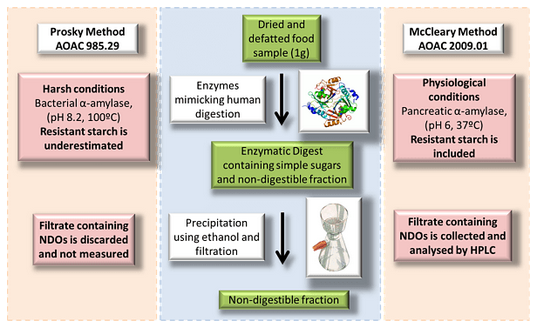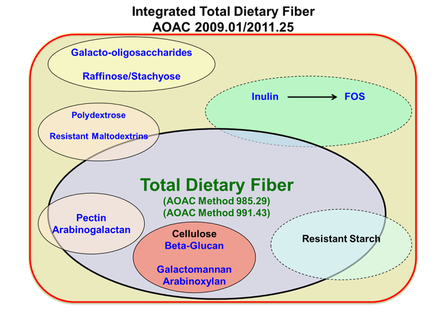Measurement of dietary fibers
The fiber content in a sample is measured in the laboratory by what is called an "enzymatic-gravimetric method".
After defatting, a food sample is treated with enzymes that mimic the digestive process in the human small intestine.
Digestible carbohydrates are broken down into simple sugars and removed from the sample by precipitation and filtration. This mimics absorption of these sugars in the body.
The non-digestible precipitate contains the dietary fiber but also contains protein and inorganic material. These should not be included in dietary fiber so protein and inorganic material must be measured separately and subtracted from the weight.
Discover our offer of assay kits, enzymes et complementary products (acide washed celite, total dietary fibers controls, buffers, tampons, ion exchange resins,…).
Dietary fiber measurement methods
1) Prosky method (AOAC 985.29, AOAC 991.43)
Introduced in 1985. Uses bacterial α-amylase and harsh conditions (pH 8.2, 100ºC) for the enzymatic incubation step. This method does not measure all components of dietary fiber as currently defined by CODEX Alimentarius (international regulatory body for food ingredients). Most resistant starch and all non-digestible oligosaccharides are not included which results in an underestimation of dietary fiber.
LIBIOS offers you the K-TDFR assay kit, leader on the market or the corresponding enzymes to adapt your analysis.
2) McCleary method (AOAC 2009.01, AOAC 2011.25)
Introduced in 2009. Uses pancreatic α-amylase and conditions much closer to physiological (pH 6, 37ºC) for the enzymatic incubation step. This method measures all components of dietary fiber as currently defined by CODEX Alimentarius. LIBIOS offers you the K-INTDF assay kit for this method.
3) Rapid Integrated Total Dietary Fiber
Introduced in 2015. Closely resembles AOAC 2009.01. This method addresses the minor limitations that have been identified in the McCleary Method (AOAC 2009.01) notably the incubation time which is reduced.
LIBIOS offers you the K-RINTDF assay kit, an innovative and improved test to strictly follow the Codex Alimentarius definition.
19 years
Know-how
and expertise
Listening and reactivity
Customized support
Presence
France and Export
Reliability
Quality control
in our premises


